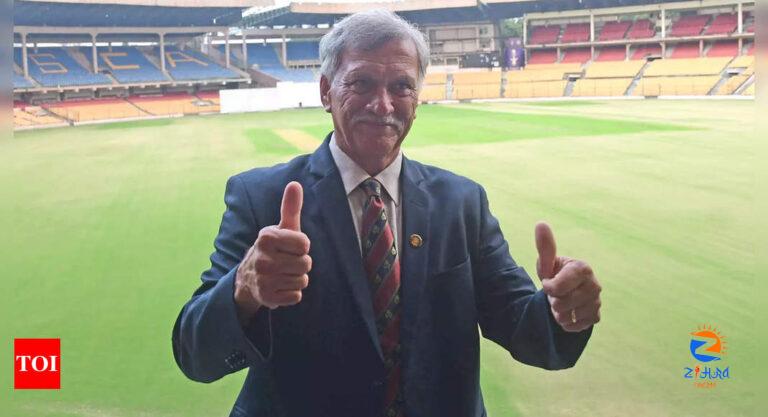
[ad_1]
A stalwart known for underselling himself, Binny shies away from the limelight. Now, however, with his elevation as president of BCCI — the richest cricket body in the world — the focus is firmly on the 1983 World Cup hero. He is still getting used to it.
On Thursday, Binny returned to KSCA, where he served as president until Tuesday, to a steady stream of visitors waiting to greet him, take selfies and of course give him unsolicited advice. He then addressed a press conference.
Between well-wishers and reporters, Binny took time out to speak exclusively to TOI. He spoke in detail on taking over the reins of BCCI, domestic cricket, the challenges he is likely to face and more.
What was your reaction when you were asked to file nomination for the BCCI president’s post?
I was shocked when I was asked to file the nomination. I did expect to be in contention for some post, but that wasn’t for the top job. When I was told that I would be the president, it took a whole night for it to sink in.
My best wishes to Mr. #RogerBinny on being elected as the new president of the @BCCI. I’m sure the board will benef… https://t.co/lAVS0fvoJu
— Yuvraj Singh (@YUVSTRONG12) 1666078480000
Did you have any apprehensions on taking on the role?
No. For over five decades I’ve been involved in cricket in various roles and administration is nothing new. I love challenges and I’m going to enjoy this as well. That said, it is going to be challenging. I’m going to put all my cricketing experience into this. I’m well-travelled across the country and I know what we lack and what we need. I have a three-year term and I want to work to the best of my ability and make things smoother to those who come after me.
How much of a difference can cricketers make in administration?
A lot. I came into administration in 1998 when a group of cricketers got together because we believed KSCA needed the touch and expertise of cricketers. I came in as a managing committee member then. Back then I knew we could make a difference especially in developing the sport in the districts. That was my stepping stone into administration and I learnt a lot. We initiated some player-friendly policies. In Karnataka, a player who has featured in even one Ranji Trophy match gets a pension and that was initiated more than two decades ago.
Many congratulations to Mr. #RogerBinny on being elected as the next @BCCI president. My best Wishes to you!
— Ajinkya Rahane (@ajinkyarahane88) 1666106809000
Will the BCCI president be approachable for cricketers?
I’ve never carried the weight of being a Test cricketer or a member of a World Cup winning team. I will never change, if I had to I should have decades ago. I’ve always told players my doors are open. I have never said no to any player in the past, I definitely won’t say now.
Your thoughts on the current state of domestic cricket?
I feel sad to see the state of Ranji Trophy. Given the tight international calendar, there is waning interest among international players towards Ranji Trophy. We didn’t play as much international cricket as the current cricketers, but we took a lot of pride in coming back and playing for our state, club or employers. We did so because it made a lot of difference to the youngsters as they got an opportunity to play alongside a Test cricketer. The spirit with which Ranji Trophy was played is missing and that needs to be brought back.
The sad part in India is, a majority of the current generation follows franchise cricket or internationals. In countries like England, you’ll see 10,000-12,000 people in county matches but hardly a handful in major cities. You can’t change the format, but we must find ways to make it more appealing. We want the focus to be on the longer format of the game, which includes the Duleep Trophy and Irani Cup. With the pace at which T20 is growing, the onus is on the administrators and cricketers to ensure red-ball cricket does not fade away.
What is your take on cricketers turning coaches?
Given the structured courses on offer in NCA, there are plenty of coaches, but not many jobs. What we need to do is find them jobs. In Karnataka, one of the things we did was to ensure every team, even at the league level has a coach and a trainer. We encouraged even school teams to do the same. It would augur well for coaches if we can have a similar system throughout the country.
[ad_2]